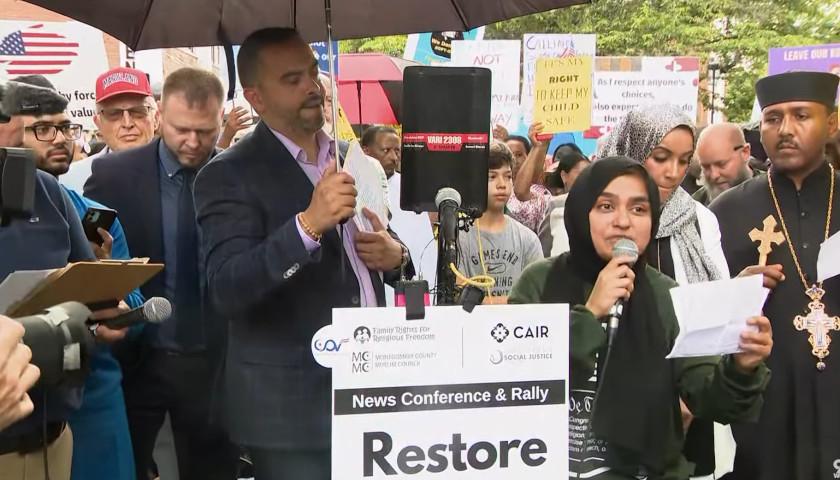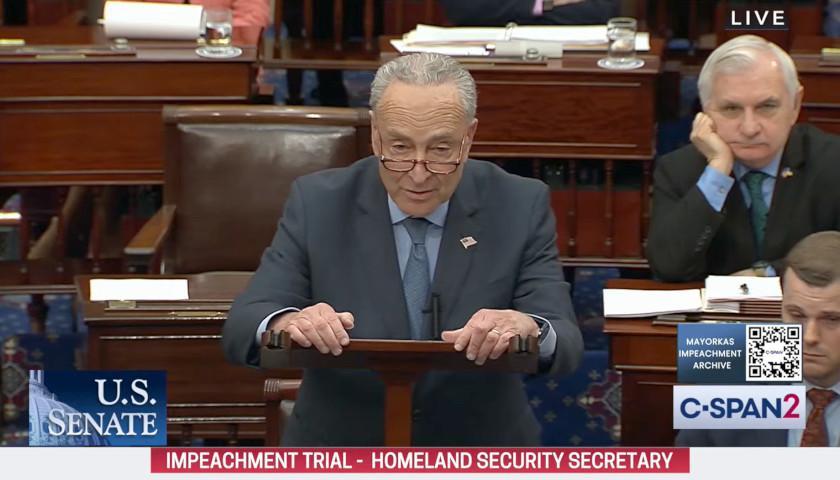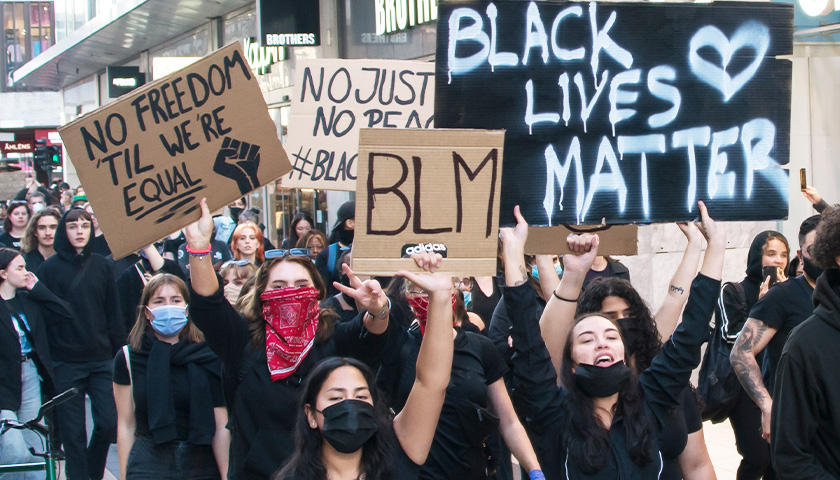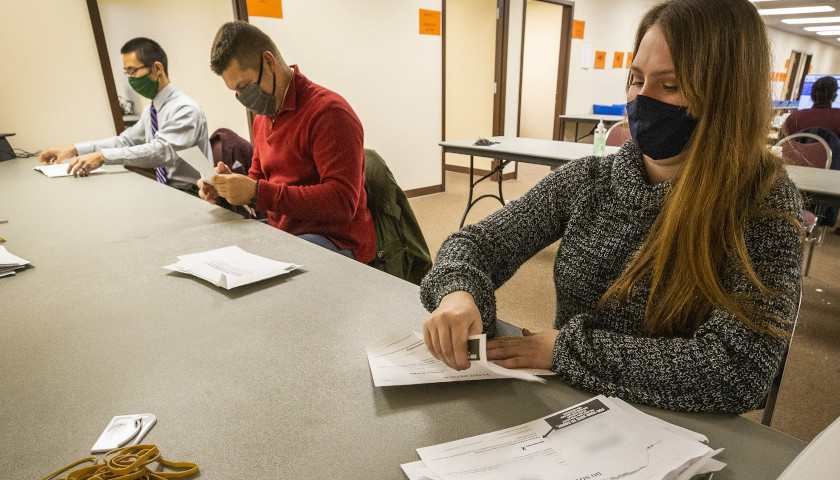by Greg Piper
A wealthy suburb of Washington, D.C., doesn’t inherently object to shielding even older students from sexually mature material. It just doesn’t want to give the choice to parents.
Maryland’s Montgomery County Public Schools pulled a novel that celebrates a promiscuous gay teen sex columnist from high school libraries even as the district was arguing in court that parents cannot opt out their pre-kindergarten children from LGBTQ “storybooks” that portray sex workers, kink, drag, elementary-age romance and gender-identity transitions.
The district, backed by the ACLU and 18 Democrat-run states led by Maryland and Massachusetts, is fighting to uphold a federal judge’s refusal to impose a preliminary injunction on what MCPS calls its “blanket no-opt-out policy.”
The Muslim, Christian and Jewish parents who challenged the policy as an infringement of their parental rights and violation of state law, meanwhile, are getting support from 23 Republican-run states led by Virginia and a group of First Amendment scholars who argue the judge relied on “outdated, out-of-circuit authority that is largely irrelevant” to deny the injunction.
The plaintiffs, defendants and third parties filed voluminous briefs over the past several weeks in the 4th U.S. Circuit Court of Appeals, which is weighing whether to let the parents opt out their kids as the case moves forward.
Though religious liberty law firm Becket is representing the parents, the Council on American-Islamic Relations (CAIR) has led protests against the policy, creating awkward optics for the group’s typical liberal allies.
The district’s high school library media specialists potentially made its legal position more awkward when they removed the book “Jack of Hearts (And Other Parts)” on Oct. 11, just before briefs started pouring into the 4th Circuit.
While acknowledging that library journals deemed the book “sex positive,” the media specialists called it an “extreme outlier” of what district libraries view as “appropriate” even for older students, according to an MCPS evaluation obtained via public record request by local media outlet MoCo360.
The district and its backers portray the storybooks, incorporated into the English Language Arts curriculum, as a matter of identity and representation and thus irrelevant to the Family Life and Human Sexuality curriculum. Districts must approve opt-outs for the latter under state law.
The storybooks “impart critical reading skills through engaging, age-appropriate stories” featuring “LGBTQ characters,” MCPS said in its brief. It denied the books “prompt children to explore romantic feelings or question their sexual orientation or gender identity,” as portrayed by the parents’ “prurient caricatures” – excerpts from the books themselves.
Simply exposing children to “ideas” does not burden free exercise of religion, and no court has ruled otherwise, the school district claims.
JACK OF HEARTS (AND OTHER PARTS) by @LevACRosen is seriously one of the best LGBT+ books I've ever read. Sex positive YA suspense that's one part Gossip Girl, one part best sex ed. class you've never had, all parts fun.
Read my review here: https://t.co/vRBM3uZVxy pic.twitter.com/5ANYhxtOzq
— Nenia Campbell, Penner of Villain Romances 🖤 (@NeniaCampbell) June 7, 2020
The district’s argument “violates every relevant Supreme Court ruling,” the parents shot back in Becket’s reply brief: “Compulsion against faith, pressure to abandon faith to access government benefits, differential treatment of religion, and religious targeting.”
They urged the 4th Circuit to look at what MCPS isn’t disputing: Its board said the storybooks were intended to “disrupt” what it called “heteronormativity” and “either/or thinking” on gender and sexuality, and that teachers might instruct children that “gender is anyone’s guess at birth.”
The Democrat-run states’ friend-of-the-court brief warned that letting MCPS parents opt out their own children could endanger “LGBTQ+ youth” throughout the 4th Circuit, which is based in Richmond, Va.
“These youth often experience discrimination, harassment, and stigma, causing tangible mental and physical harm and restricting their ability to realize their potential,” the states argued. They will be “happier, healthier, and more academically successful” if they “feel supported and included at school” via the storybooks that represent their identities.
The storybooks “explore themes of family, belonging, adventure, and love—themes that are archetypal and familiar in children’s storybooks,” according to the ACLU’s friend-of-the-court brief, citing “Pride Puppy” and “Uncle Bobby’s Wedding.”
The civil liberties group largely reiterated the district’s argument that the blanket policy is content-neutral because it also rejects secular exemptions and was imposed based on a flood of opt-out requests, which made alternative instruction for those children “infeasible.”
MCPS has consistently declined to specify how many requests it received, but the district didn’t express concern about the logistics of accommodating opt-outs in internal records obtained by Becket and CAIR.
Because the blanket policy was “not rooted in animus toward religion, but rather in a desire to resolve the problems created by the previous opt-out allowances,” it should be subject to the lower legal standard of “rational basis review,” not the higher “strict scrutiny” demanded by the parents, the ACLU said.
Regardless of which curriculum the storybooks are featured in, the policy “requires children to participate in sex education” over their parents’ wishes in explicit violation of Maryland law, the Republican-led states said in their friend-of-the-court brief.
Maryland and the Democrat-run states dismiss “hundreds of years” of governments going back to English common law deferring to “parental preferences” over their children’s education, the brief says, arguing that strict scrutiny is the only relevant legal standard.
Prominent religious liberty legal scholars including the University of Virginia’s Douglas Laycock, George Mason University’s Helen Alvare and Stanford’s Michael McConnell, a former 10th Circuit judge, blasted the district’s understanding of free exercise legal precedents, which they said the Supreme Court has “substantially refined” in the past two decades.
The high court has made unambiguous that “parents have a broad right to direct the religious upbringing of their children; that religious claimants have the best understanding of the importance of their own religious beliefs; that indirect coercion is a burden on free exercise; and that the government cannot evade constitutional limits by casting its benefit programs as a voluntary ‘choice’ by the religious claimants,” they wrote.
The key to relevant precedent is whether the parents’ objections are “rooted in religious belief,” not how substantially their free exercise is burdened, and strict scrutiny applies “no matter the action’s neutrality or general applicability,” the scholars argued.
They mocked the district’s claim that the storybooks involve no “per se” instruction on sexual orientation or gender identity. This is “as convincing as suggesting that reading The Boy Who Cried Wolf involves no lesson on lying ‘per se,'” the brief says.
– – –
Greg Piper has covered law and policy for nearly two decades, with a focus on tech companies, civil liberties and higher education.
Photo “Montgomery County Public Schools Parents Press Conference” by WUSA9.








